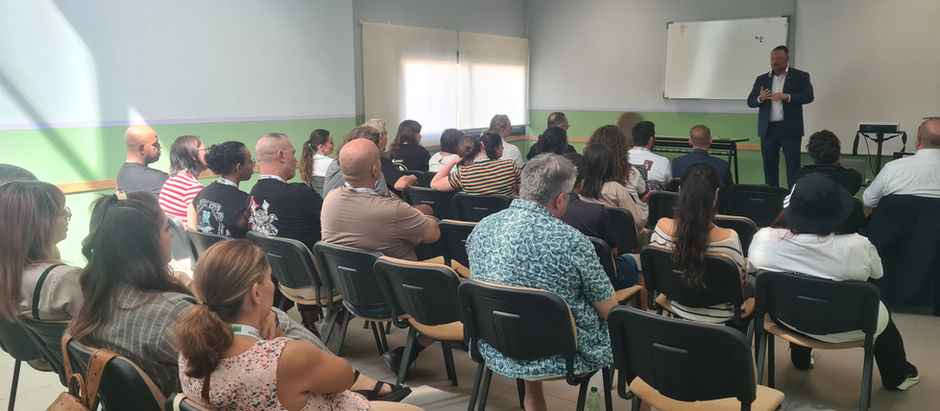top of page
News
Search


VIEWS Research Published: Good Practice in Inclusive Sport Volunteering
As part of the EU-funded VIEWS (Volunteering for Inclusion and Empowerment With Sports) project, INSIDE EU coordinated research across seven countries to create a seminal definition of good practice in inclusive volunteering in sport. The research has been published in the 4th edition of the ICSE 2025 Book of Abstracts , which brings together the scientific and professional contributions presented at the 4th International Conference on Sports and Education, held on 14–15 Nove
Feb 2


Teacher Training Event in Behaviour Management for Children with Autism
We recently hosted a comprehensive teacher training session at Redeemer Girls National School in Dundalk, Ireland, as part of the Preschool Applied Behaviour Analysis (PABA) project. The training aimed to equip primary school teachers with evidence-based strategies for managing challenging behaviours in children with autism spectrum disorder (ASD). Introduction to ASD The training began by establishing foundational knowledge about autism spectrum disorder, helping teachers re
Oct 31, 2025


PABA Project Multiplier Event: Sharing Knowledge on Early Childhood Behaviour Management
This month, we hosted a Multiplier Event in Dundalk, Ireland to disseminate the results and resources of the Preschool Applied Behaviour Analysis (PABA) project to a wide audience of teachers, headteachers, support staff and stakeholders in early childhood education. The Goals of The Project The PABA project addresses a critical need in European education: equipping preschool teachers with the skills to provide effective early interventions for children with autism spectrum d
Oct 31, 2025


CIGTEY Training Events and Youth Forum: Building Inclusion Through Civic and GovTech
CIGTEY is a 24-month Erasmus+ KA220 Youth partnership funded at €120,000, working across Poland, Ireland, Ukraine and Turkey to strengthen inclusion and active citizenship by building practical confidence with Civic Tech and GovTech for young people with fewer opportunities. The project recently delivered two successful training events alongside a multiplier Youth Forum in Ireland, helping young people and stakeholders explore how digital tools can remove barriers to particip
Sep 30, 2025


What Does Good Practice in Inclusive Volunteering Actually Look Like?
Sport has the power to bring people together, but when it comes to volunteering opportunities, are we really creating spaces where everyone can contribute meaningfully? This question sits at the heart of the Volunteering for Inclusion and Empowerment With Sports (VIEWS) project, which recently conducted research to understand what good practice in inclusive volunteering means from the perspectives of those who matter most – people with disabilities themselves. Hearing from Th
Apr 15, 2025


Houses4Autism: Performing an Inclusive and Accessible Survey
One of the main goals of the Houses4Autism Erasmus+ project was to identify the barriers faced by people with autism when it comes to independant living. Surveys are a common tool for gathering such insights; however, traditional survey design often overlooks the needs of individuals with disabilities such as autism. In order to overcome this obstacle, autistic people were involved in every stage of the survey process, from question development to data analysis. This approach
Nov 22, 2024


PABA: Improving Education for Children with Autism
The Preschool Applied Behaviour Analysis (PABA) Erasmus+ project is developing resources to empower educators in supporting young children with Autism Spectrum Disorder (ASD). Addressing a Critical Need A recent study highlighted a concerning lack of training for preschool teachers across Europe, particularly regarding inclusive education and managing early childhood behaviour. The project recognises the key role preschool teachers play in shaping these children's development
Oct 29, 2024


Launching the CIGTEY e-book on Civic and GovTech for Youth Participation
We are pleased to announce the publication of the CIGTEY e-book, Technology for the Youth: The Inspiring Potential of Civic and GovTech for Engagement, Participation and Inclusion , created through a €120,000 Erasmus+ KA220 Youth cooperation partnership led by Fundacja Eduvibes with partners in Poland, Ireland, Ukraine and Turkey. The project’s goal is to foster inclusion and active citizenship among young people with fewer opportunities by building practical confidence in c
Oct 10, 2024
Funded by the European Union. Views and opinions expressed are however those of the author(s) only and do not necessarily reflect those of the European Union or the European Education and Culture Executive Agency(EACEA). Neither the European Union nor EACEA can be held responsible for them.
bottom of page
